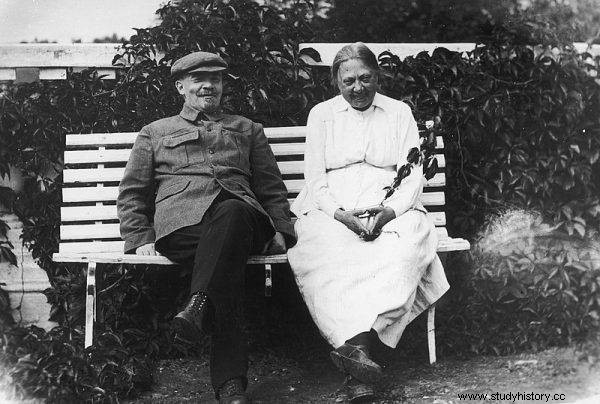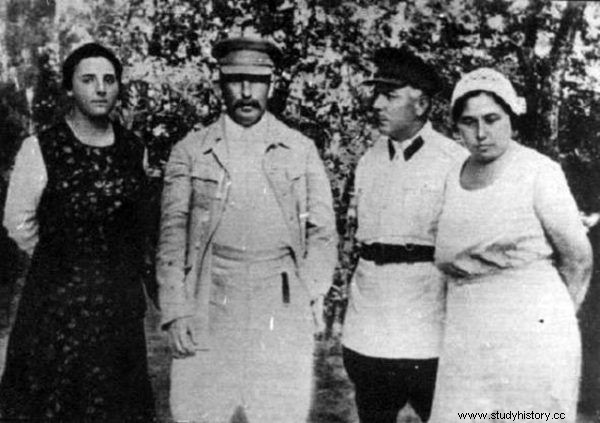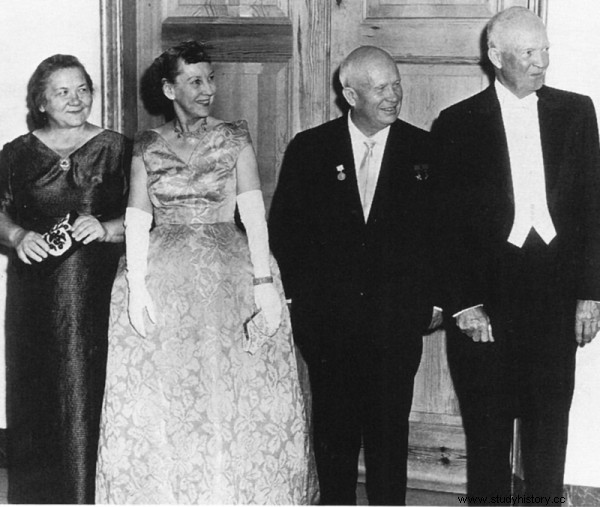In the Soviet Union, the term "first lady" was virtually unknown. Politics was considered the domain of men. Besides, no one would think to be interested in the family life of party dignitaries, which was kept in the strictest secrecy.
In fact, there were only two women in the minds of citizens:Nadezhda (Nadia) Krupska, the wife of the founder of the Soviet state, and Raisa Gorbachev, the wife of the first and last president of the USSR. As for the partners of the other leaders, hardly anyone even remembers their names. It is high time to recall the history of women involved in Soviet politics.
Dictator Nadezhda
Nadezhda Krupskaya, Lenin's faithful companion since 1898, was the first to receive this honorable function. Admittedly, her own husband referred to her as "the country's first scratch" because Nadia wore leaky and washed clothes, and when a button broke, she did not sew it on . At the same time, however, he entrusted her with the function of the deputy head of the ministry of education.
In this position, Nadezhda began the fight against the Orthodox Church and other Churches. She directed her actions primarily towards children, because - in her opinion - "anti-religious propaganda should be started early still in school age, because young people quickly become interested in these issues. ”

Lenin and Nadezhda Krupska
Lenin's wife was, as Russian journalist Oleg Smirnov put it, "a pioneer in the field of Soviet censorship." Krupska ordered library workers to "withdraw ideologically harmful and outdated literature" (that is, the works of Plato, Descartes, Nikolai Leskov and Arthur Schopenhauer). The employees of these institutions were reluctant to dispose of the collections, so the secret police officers - the infamous Cheka commanded by Feliks Dzerzhinsky, participated in the requisitioning of books.
Larysa Vasiliev, the author of the book "Kremlin wives", considered her a dictator:"If fate had so offered the highest power to Nadezhda Krupskaya, would probably be better able than Stalin to introduce a cultural inquisition because she was more educated. ”
After Lenin's death, Nadia worked in the People's Commissariat of Education. She was respected there. She wrote memories of her husband in which she created his impeccable image. She died in 1939 at the age of 70.
Invisible
It is not known whether the working people of the Soviet Union knew at all who Joseph Stalin's wife was, because in the press and other official documents of that time she was referred to as "comrade Nadezhda Alliluyeva" (the woman kept her last name).
As the Bolsheviks promoted women's work, Nadia did not want to be a housewife . In 1919, she became Lenin's secretary. After his death, she started working in the Nationality Commission and then in the editorial offices of the newspapers "Prawda" and "Rewolucja i Kultura". In 1929, she began studies at the Industrial Academy. When she was driving to college in a government car, she told the driver to stop a block from the college building. She demanded that no bodyguards be around her.

The marriage of Stalin and Nadia was not successful
The family life of Alliluyeva and Stalin was far from ideal. The dictator expected his 22 years younger wife to obey him. He was bitterly disappointed. As Lenin's secretary, Nadia had access to top secret documents, but did not disclose their contents despite her husband's insistence . She did not clean, cook, or perform other activities traditionally assigned to women.
She did not hesitate to tell Stalin that she did not support the trials of "enemies of the people" he was arranging, so the atmosphere in their apartment was tense. As the former secretary of the dictator Boris Bażanow wrote, at home the politician "behaved like a despot, remained silent all day, did not answer the questions of his wife and son". He spoke publicly about the inferiority of women.
On the night of November 8-9, 1932, Nadezhda committed suicide by shooting herself in the head. Stalin was devastated, but his despair was not caused by missing his wife but… angry. He felt insulted because Nadia had ruined his reputation by taking her own life! He ordered not to investigate Alliluyeva's death - despite suspicions that third parties were involved in her death.
Wiktoria Brezhnev, affectionately called by her husband Vicia, also stayed out of the way. Although Leonid Brezhnev often made official visits abroad, his spouse accompanied him only twice:in India and in France. "I didn't like these journeys and when it was impossible to go, I stayed at home," she admitted years later. She preferred to… cook her husband his favorite dishes from traveling abroad and meeting at the summits. And Leonid highly appreciated his wife's cooking skills:"Nobody cooks better than Wici".
About the spouse of Yuri Andropov (1982–1984), it is only known that her name was Lyudmila and she was 28 years younger than him. Also Anna Czernienko, wife of Konstanty (1984–1985), stayed away from public life. Besides, her sick husband spent most of his time in the hospital and ruled the country from there.
Western-style ladies
One can risk a statement that the role of the first ladies grew with the liberalization of state policy. It happened during the reign of Nikita Khrushchev - his spouse Nina began to accompany him on foreign visits. In the eyes of the West, this woman, badly groomed, without makeup, with a shapeless figure and unfashionable clothes, became a symbol of the post-Stalinist thaw.
Nina knew the diplomatic protocol and even spoke English (she also spoke Polish, because she was born in the Kingdom of Poland, in the Lublin governorate). During Khrushchev's visit to the US, she talked to Rockefeller himself, who admired her knowledge of economic affairs and ruled that ... she is more educated than her spouse.

From the left side:Nina Khrushchev, Mamie Eisenhower, Nikita Khrushchev, Dwight Eisenhower
Raisa Gorbachev also accompanied her husband on foreign and domestic visits. "Why is he dragging her with him?" - they asked unfriendly. Why did she cause so many negative emotions? First of all, because in the USSR, social and political life was dominated by men. Well, the most critical words came from women, who thought that the wife's place was at home, not in the salons . Citizens were also outraged by the fact that, after thirty years of the relationship, the spouses were still holding hands and showing affection in public.
Gorbachev did not hide that he discussed all state matters with his wife. Raisa's participation in public life delighted Westerners. But the more popular it was, the more resentment of its fellow citizens grew. In their opinion, Gorbachev was too much influenced by "girl's influence." Moreover, the woman was accused of having her "rule" destroyed the Soviet Union.
The attitude of citizens towards Raisa did not change until the summer of 1999, when she was diagnosed with leukemia. Sympathy and sympathy began to flow to the Gorbachevs. Despite treatment in one of the best clinics in Germany, the woman died. Mikhail then announced, "My life is over."
Bibliography
- Vasiliev L., Kremlin wives. Warsaw, 1998.
- Wiernicka V. Secrets of the Country of Soviets, Łódź, 2020.
- "Звезда Раиса" (radio broadcast on radio "Svoboda" on October 27, 2019).
